100: Stargate Atlantis Cast Reunion (Special)
100: Stargate Atlantis Cast Reunion (Special)
More Posts from Sorayali20 and Others
Traveler’s blessing
Kom chilnes yu na ban sishou-de au, Kom hodnes yu na hon neson op. Gouthru klir hashta yu soujon, Kom taim oso fali kom daun gon graun-de. Mebi oso na hit choda op nodotaim.
In peace, may you leave the shore. In love, may you find the next. Safe passage on your travels, Until our final journey to the ground. May we meet again.

A closer look at Elizabeth and John in the episode "Echoes"✨

He reacts instantly as soon as she starts to fall. He is so considerate of her. AND! He puts his hand under her head before it touches the ground to prevent her from bumping😯
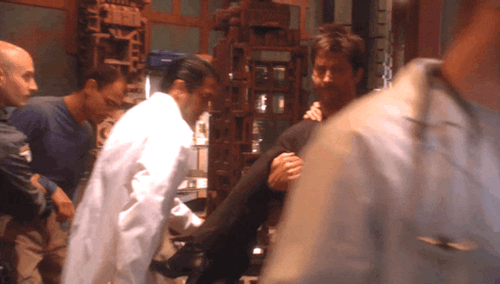
He carries her in his arms! Who watched, I think, everyone loves this moment. He cares about her. He decided not to call the medical team to take her away. He takes her in his arms and carries her himself! AND DETAIL! She's unconscious. Consequently, she cannot think and move herself. He put her hand on his shoulder. HIMSELF! There is no other way to explain it. How he laid her gently on the bed. So neat. So tender. Until the last he held her in his arms😲
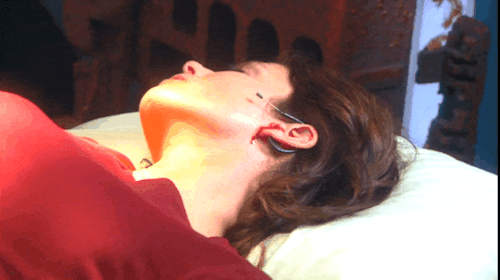
Even when the doctor has already come, he does not leave her. He wants to make sure that everything will be fine with her. Who remembers, Beckett said there was already a fatal case. He said this while Elizabeth was lying unconscious on the bunk. She was in danger. Only after this, John decided to make an attempt to cope with the problem himself. Because he worried about her🥺
how did you get into writing and getting published?
I’ve always loved writing. I wrote poetry and stories all the time when I was a kid. I have piles and piles of notebooks at my house full of decades’ worth of everything from fanfic smut (decades before I had the internet and knew that “fanfic smut” was a thing) to terrible poetry to novels in progress. I didn’t know that being a writer was a real job people could have, I just liked to write and make up stories.
I went to college to study theatre because I thought I wanted to be an actor (as it turns out, I VERY MUCH did not). My school didn’t offer playwriting on the regular, but we had a visiting professor for a year who was a playwright and I took his class, and he was the first person who said to me, “You know, if you wanted to do this, this is something you could do.” I wrote my first play for his class (reblogginhood was in it!) and kept writing after that.
Then at some point in my twenties, I don’t really know why, I stopped writing. I think I hit a point where I had kind of decided, “okay, this isn’t practical, this isn’t a real career, I need to figure out how the fuck I’m going to pay my electric bill, I need to give up this dream and go, like, be a regular human.” So I did that for awhile. I got into the world of arts management and worked for a bunch of different theatre companies doing marketing and fundraising and things like that. And it was fine, I was good at it, I met a lot of people in the theatre world and all my friends were cool artists and it was great, but then it made me really sad because there was a part of me that felt like they were living this great exciting life I wasn’t living because I had stopped trying to even have that.
Then a friend of mine asked me to help her write grants for this new project she was starting, which was a citywide new play festival that anyone could be in. You didn’t have to be fancy or famous, you didn’t have to even be any good. You just had to write a play, and show up. So I signed up and I paid my fee and for seven years in a row, every year I wrote a new play for the festival. I just kept writing and writing and writing and writing. It was a huge amount of hard work. I lost money on every show because I was paying actors out of my own pocket and printing playbills at Kinkos. I borrowed coffee shops and warehouses from friends, anywhere I could perform for free. I directed the shows myself if I couldn’t afford a director. I ran sound off my iPod. I tore my own tickets at the door. I was working two jobs, around 60-hour weeks, and then writing until like 2 in the morning because that was the time that I had. And then slowly, I got better. My crappy amateur plays, where I was trying to copy the voices of other, better writers improved because I started to figure out what I really cared about and what I really wanted to say. I applied for tons and tons and tons of awards and grants and fellowships and residencies. I won a couple of them (maybe one out of every 50 things I applied for) and that helped get other people to take me seriously, but the most important thing was that I just kept writing and writing. I had a new play in the festival every year, so slowly people started to know who I was and recognize my name. Not zillions of people, but handfuls at a time. The first show had like 30 people in the audience each night; I worked my way up to being able to fill a 200-seat venue. Then I got asked to join a company of local playwrights who produce one show a year by one of their member writers; they had watched me busting my ass over the past seven or eight years and knew that I was a hard worker and had been watching my work get better and then finally one day they asked me to join and offered me a full production of one of my plays. (That’s happening next month.)
In between writing plays, I wanted to challenge myself, so I tried a few times to do National Novel Writing Month. I never finished, but I had a few chapters of a time travel science fiction story about Watergate that I was noodling around with that I really liked, and from time to time I would pick it up and play with it some more in between theatre projects. Then one day my brother, who is an L.A. film editor, called me to tell me that a company he worked with was branching out from film into publishing and was looking for science fiction novels. I didn’t have a novel, I had like four chapters and some shrapnel, and was reluctant to show it to anyone, but my brother sent it off to his friend anyway, and they called me three days later to tell me they wanted to publish it and would pay me an advance to finish it. (It’s coming out this summer.)
There are an infinite number of different directions a writing career can go, and no one writer’s path to success is necessarily replicable by any other writer. I’m fully aware that my story of how I got a novel published is a weird one with a strange combination of luck and coincidence and circumstance and privilege and a million other forces I can’t control which resulted in my unfinished novel landing on the desk of someone looking for just such an unfinished novel. But the important part is everything that happened before that, all the years of staying up until three in the morning or skipping happy hours with friends because I had to write, all the years of staged readings of mediocre plays where I was paying actors in pizza and hugs because I had no money, and even all the years of working demanding and tedious marketing and fundraising jobs for theatre companies, because that was how I became a writer. There’s how to become a writer, and then there’s getting a book published. Honestly I still cannot tell anyone how to get a book published. “Have a brother who knows someone starting a publishing company” isn’t a career plan. But I can tell you how to be a writer. You just have to write.

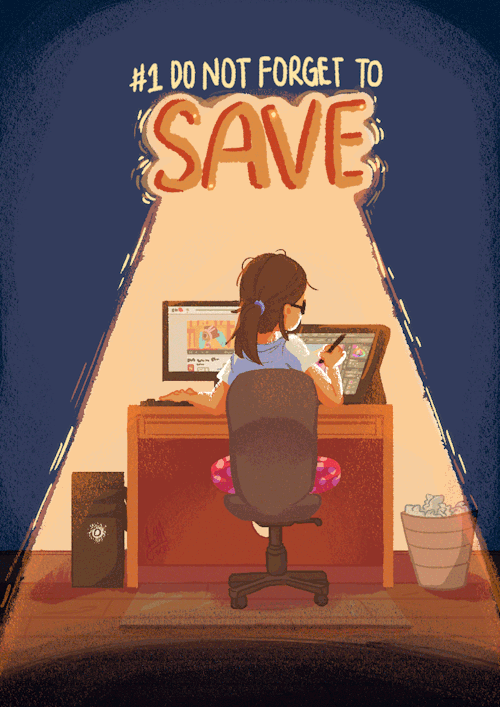
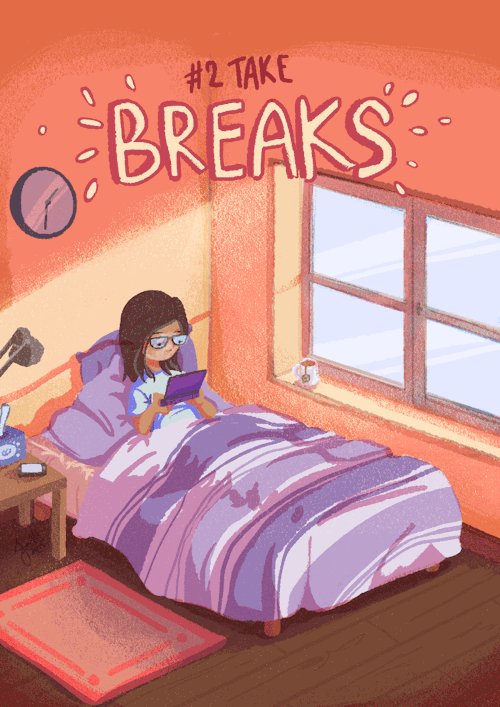
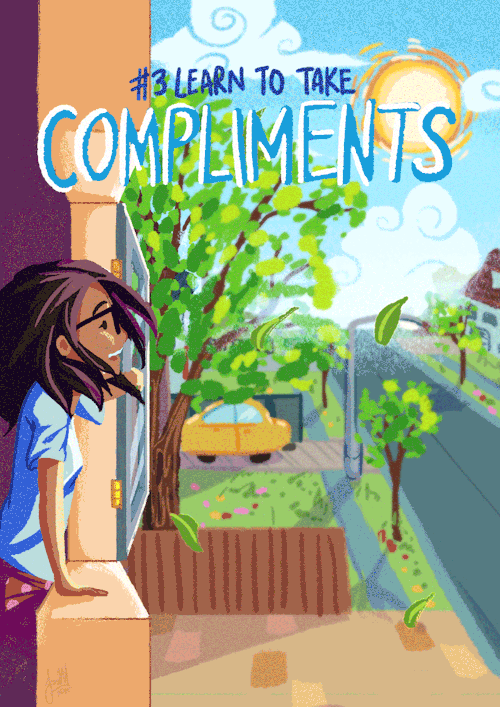
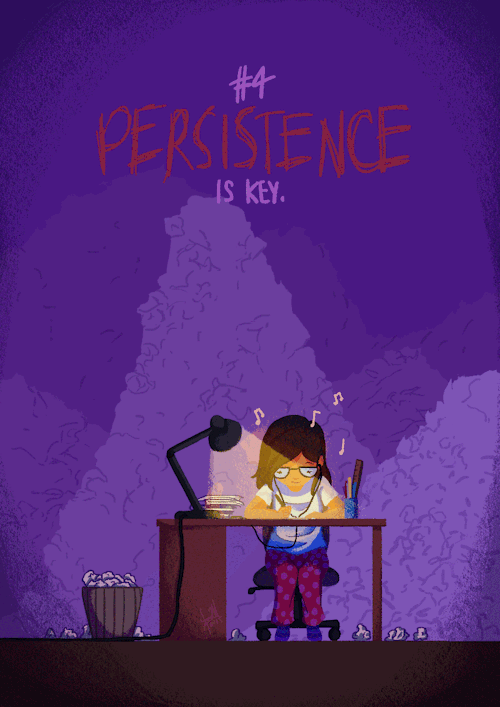

some things I need to remind myself daily tbh
How to Get Motivated After a Long Break
I haven’t written in a while. I had some life stuff going on and I forgot how difficult it is to get back into writing after a long break. There’s a manuscript waiting for me to edit it and another story idea waiting for me to flesh it out. What’s the best way to approach this?
First, make a list
Start by getting everything in order. Grab your favorite notebook (or designate a new on to 2016) and starting listing what you want to work on this year. Is there anything you need to finish up? What are your goals? What do you want to accomplish by 2017? These plans don’t have to be anything grand, they can be small steps toward your goals. Be realistic and know your limits.
Focus on tying up loose ends
The first thing I’m going to do is finish up the novel I’m in the middle of editing. Do you best to finish projects first before moving on to something else. Engross yourself in that story again and try to continue where you left off. Try to reread what you already edited to familiarize yourself with where you were going. It feels great to finish things. It will get you motivated for your next project.
Get yourself excited again
It’s hard to work on something that doesn’t motivate you. If it’s been a while, try to figure out what excited you about that project in the first place. Reread old notes. Look over your story and focus on characters. Why do you like them? What motivated you to write this story? Try to tap back into your excitement and get back into the same mind frame you were in when you were writing.
Toss stale projects
Sometimes a story just doesn’t work. You lost your passion for it and you’re unable to get a back. The story feels old and it doesn’t speak to you anymore. That’s fine. Not everything is going to stick and you need to know what you should move on from. If you’ve stopped writing because you’re just not excited about your story, maybe it’s time to move on. However, if you’ve stopped writing because life got in the way, there’s a chance you can still motivate yourself to work on that story. The decision is up to you.
-Kris Noel
Chapters: 3/? Fandom: The Mallorca Files (TV 2019) Rating: Teen And Up Audiences Warnings: No Archive Warnings Apply Relationships: Miranda Blake/Max Winter Characters: Miranda Blake, Max Winter, Inés Villegas Additional Tags: Wintake, post-series 3, Canon Divergent, Feelings Realization, Series 3 Episode 4 "Water Water" Mention, Undercover as a Couple Summary:
It’s Valentine’s Day, and it’s the first one since Max broke up with Carmen six months ago. Miranda tries to cheer Max up. Also, they go undercover as a couple again.
“Getting” yourself to write
Yesterday, I was trawling iTunes for a decent podcast about writing. After a while, I gave up, because 90% of them talked incessantly about “self-discipline,” “making writing a habit,” “getting your butt in the chair,” “getting yourself to write.” To me, that’s six flavors of fucked up.
Okay, yes—I see why we might want to “make writing a habit.” If we want to finish anything, we’ll have to write at least semi-regularly. In practical terms, I get it.
But maybe before we force our butts into chairs, we should ask why it’s so hard to “get” ourselves to write. We aren’t deranged; our brains say “I don’t want to do this” for a reason. We should take that reason seriously.
Most of us resist writing because it hurts and it’s hard. Well, you say, writing isn’t supposed to be easy—but there’s hard, and then there’s hard. For many of us, sitting down to write feels like being asked to solve a problem that is both urgent and unsolvable—“I have to, but it’s impossible, but I have to, but it’s impossible.” It feels fucking awful, so naturally we avoid it.
We can’t “make writing a habit,” then, until we make it less painful. Something we don’t just “get” ourselves to do.
The “make writing a habit” people are trying to do that, in their way. If you do something regularly, the theory goes, you stop dreading it with such special intensity because it just becomes a thing you do. But my god, if you’re still in that “dreading it” phase and someone tells you to “make writing a habit,” that sounds horrible.
So many of us already dismiss our own pain constantly. If we turn writing into another occasion for mute suffering, for numb and joyless endurance, we 1) will not write more, and 2) should not write more, because we should not intentionally hurt ourselves.
Seriously. If you want to write more, don’t ask, “how can I make myself write?” Ask, “why is writing so painful for me and how can I ease that pain?” Show some compassion for yourself. Forgive yourself for not being the person you wish you were and treat the person you are with some basic decency. Give yourself a fucking break for avoiding a thing that makes you feel awful.
Daniel José Older, in my favorite article on writing ever, has this to say to the people who admonish writers to write every day:
Here’s what stops more people from writing than anything else: shame. That creeping, nagging sense of ‘should be,’ ‘should have been,’ and ‘if only I had…’ Shame lives in the body, it clenches our muscles when we sit at the keyboard, takes up valuable mental space with useless, repetitive conversations. Shame, and the resulting paralysis, are what happen when the whole world drills into you that you should be writing every day and you’re not.
The antidote, he says, is to treat yourself kindly:
For me, writing always begins with self-forgiveness. I don’t sit down and rush headlong into the blank page. I make coffee. I put on a song I like. I drink the coffee, listen to the song. I don’t write. Beginning with forgiveness revolutionizes the writing process, returns its being to a journey of creativity rather than an exercise in self-flagellation. I forgive myself for not sitting down to write sooner, for taking yesterday off, for living my life. That shame? I release it. My body unclenches; a new lightness takes over once that burden has floated off. There is room, now, for story, idea, life.
Writing has the potential to bring us so much joy. Why else would we want to do it? But first we’ve got to unlearn the pain and dread and anxiety and shame attached to writing—not just so we can write more, but for our own sakes! Forget “making writing a habit”—how about “being less miserable”? That’s a worthy goal too!
Luckily, there are ways to do this. But before I get into them, please absorb this lesson: if you want to write, start by valuing your own well-being. Start by forgiving yourself. And listen to yourself when something hurts.
Next post: freewriting
Ask me a question or send me feedback! Podcast recommendations welcome…
No matter how many times you fail to meet your own expectations, you have to forgive yourself. Despite contrary belief, dwelling on and badgering yourself over your faults doesn’t ever help you grow into who you want to be.
It’s like gardening: if your flower isn’t blossoming like you want it to, you don’t rip out its leaves as punishment for failing to satisfy you. You recognize the problem and figure out what’s going wrong with its environment so you can modify it, giving the flower a chance to bloom in its own time.
Accept your shortcoming or setback, forgive yourself, and figure out what’s going wrong so that you can plan for how to prevent it from repeating in the future. Thank your past self for trying in the first place and then give your future self the love needed to flourish.
Writing Resources Masterlist
Masterlist of…
Facial Expressions
50 Romance Plot Ideas
Gestures and Body Language
Physical Descriptions
Voice Descriptions
Writing Sex/Body
500 Great Words for Writing Love Scenes
Synonyms for Parts of the Body
7 Rules for Writing Sex Scenes
How to Write a Sex Scene
Action
How to Write a Fight Scene
How to Write a Fight Scene (in 11 Steps)
8 Things Writers Forget When Writing Fight Scenes
Characters
How to Make Your Reader Care About Your Characters
The 5 Absolute Dimensions of Character Personality
5 Ways to Hide Your Villain In Plain Sight
33 WAYS TO WRITE STRONGER CHARACTERS
39 Villain Motivations
MAKING A DARK CHARACTER LIKEABLE THROUGH VULNERABILITIES
Dialogue
HOW TO WRITE ARGUMENTS WITH MAXIMUM PUNCH
19 Ways to Write Better Dialogue
50 Things Your Characters Can Do WHILE They Talk
-
 sassycop liked this · 3 years ago
sassycop liked this · 3 years ago -
 sorayali20 reblogged this · 3 years ago
sorayali20 reblogged this · 3 years ago
Aspiring author, Fan of Star Trek Voyager, Stargate SG-1, Stargate Atlantis, The 100, Marvel's Agent Carter, Sparky (John Sheppard/Elizabeth Weir), Kabby, Sam/Jack, and J/C are my OTP's
82 posts